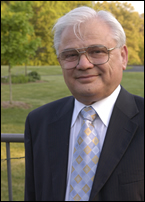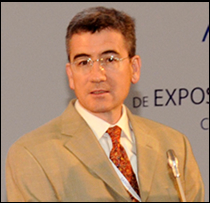Meet the ATA 2013 Spring Meeting Faculty
"This talk will challenge the myth that all is well with thyroid hormone measurement by immunoassays. Advantages of mass spectrometric measurement may permit important conceptual changes. For example, does the entity of subclinical hypothyroidism as currently defined really exist? Special attention will be placed on the reliable measurement of T3, rT3 and FT3. When should endocrinologists consider ordering T4,T3,FT4,FT3 by mass spectrometry. You should anticipate a free for all robust discussion at conclusion."- Steven Soldin, PhD Dr. Steven J Soldin received his Master's Degree in Chemistry (1965) and his PhD degree in Biochemistry (1968) from the University of the Witwatersrand in Johannesburg , South Africa. He lectured at the University of the Witwatersrand Medical School in the Department of Physiological Chemistry from 1968-71 and underwent postdoctoral training in the Biochemistry Department at the University of Toronto in 1972. In October 2011 he accepted the position of Senior Scientist in the Department of Laboratory Medicine in the Clinical Center at NIH. He currently oversees the mass spectrometry section of the clinical chemistry service and research programs and is also involved in the routine laboratory and postdoctoral training of PhD and MD clinical chemistry fellows. His research interests focus on improving current diagnostic and therapeutic tests in clinical chemistry which include the measurement of steroid and thyroid hormone profiles by tandem mass spectrometry. New foci will include measurement of a free hormone profile and evaluation of this profile in various cancers. Also measurement of bioactive peptides such as Neuropeptide Y and evaluation of the role of NPY in cardiovascular diseases and oncology.
"Thyroid hormone replacement of hypothyroid infants and children presents unique challenges. Not only do the causes and consequences of thyroid hormone deficiency differ depending on the age of the child, but normal values and dosing varies as well. In this session, you will be updated about current concepts in treating infants with congenital hypothyroidism, including special circumstances when treatment with T3 might be indicated. The controversy surrounding whether or not to treat sick hypothyroxinemic premature infants will be addressed and treatment of subclinical and overt hypothyroidism in older children and adolescents will be reviewed."- Rosalind S. Brown, MD Dr. Brown is the Director of Clinical Trials Research in the Division of Endocrinology at Children's Hospital Boston and Harvard Medical School. She was formerly the Director of the Division of Pediatric Endocrinology & Diabetes, and Professor of Pediatrics at the University of Massachusetts Medical School. She completed her pediatric residency at the Montreal Children's Hospital including a year as chief resident and trained in endocrinology both in Montreal and in Boston. Dr. Brown is involved in clinical practice, teaching and research with a focus on congenital hypothyroidism and the role TSH receptor antibodies in disease. She is an editor of 3 textbooks on Pediatric Endocrinology, has written >85 original articles, invited editorials, reviews and book chapters and served on numerous Editorial Boards. She is a former chair, Sub Board of Pediatric Endocrinology, American Board of Pediatrics.
"A concern about hypothyroidism in development is the well-known risk of neurodevelopmental impairment in the offspring. What is less clearly understood is how thyroid hormone promotes neurodevelopment. I will discuss key functions of thyroid hormone receptors and the role of deiodinase enzymes in activating or inactivating thyroid hormone during neurodevelopment." - Douglas Forrest, PhD Dr. Forrest received his PhD from Glasgow University and is currently Senior Investigator and Section Chief at the Laboratory of Endocrinology and Receptor Biology at NIDDK at the National Institutes of Health. He was previously Associate Professor of Human Genetics at Mount Sinai School of Medicine. He is the recipient of the Merck Prize of the European Thyroid Association, the Outstanding Faculty Achievement Award in Basic Science at Mount Sinai School of Medicine and the Van Meter Award of the American Thyroid Association. He was co-chair with Elizabeth Pearce, MD, of the 82nd Annual Meeting of the American Thyroid Association in Quebec City. |

 Senior Scientist in the Department of Laboratory Medicine at the National Institutes of Health, Dr. Steven Soldin, will be the speaker of "Methods for Measuring Circulating T3" during the Spring Symposium on Thursday, April 25, 2013.
Senior Scientist in the Department of Laboratory Medicine at the National Institutes of Health, Dr. Steven Soldin, will be the speaker of "Methods for Measuring Circulating T3" during the Spring Symposium on Thursday, April 25, 2013.  Dr. Rosalind Brown will be presenting the "Thyroid Hormone Therapy in Special Circumstances: Pediatrics" during the Spring Symposium on Friday, April 26, 2013.
Dr. Rosalind Brown will be presenting the "Thyroid Hormone Therapy in Special Circumstances: Pediatrics" during the Spring Symposium on Friday, April 26, 2013.  Dr. Douglas Forrest will speak about "The regulation of T3 in brain development" at the ATA Spring Summit on Thursday April 25th, 2013.
Dr. Douglas Forrest will speak about "The regulation of T3 in brain development" at the ATA Spring Summit on Thursday April 25th, 2013.